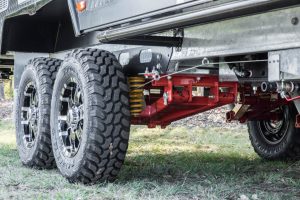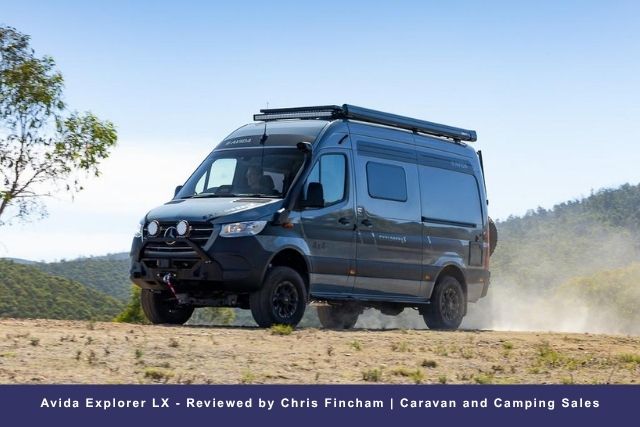
There are many different ways we can use a motorhome and there are many different tips for the different uses.
Some may enjoy the serenity and solitude and only ever free camp, others mays enjoy the social activities, security and facilities of tourist parks, others may enjoy a combination of the both, enjoying the freedom but use a park’s facilities to recharge and top up power and water.
Some may be weekend warriors, still working but enjoying their dream after the knock off bell or others have said that’s it, I’ve had enough, I’m off and gone for 6 months.
All great ways of enjoying an Avida, but there may be different ways to use and maintain them.
The common tip for all motorhomes is they should be regularly serviced, both chassis and motorhome, to provide you with the peace of mind that they will perform the way they were intended to. Apart from the components operating correctly, roof sealants maintenance is very important.
Motorhomes which are particularly used for free camping or over the occasional weekend, battery maintenance is critical. If free campers are not equipped with generators or solar panels, battery power can be exhausted in a matter of days. Motorhomes which are not always being used should be plugged into 240V regularly to keep the batteries maintained. Leaving batteries sit discharging for long periods and then charging the night before leaving may result in damaged batteries with a diminished capacity of only an hour or two.
Conserve power, if an inverter or a light is not needed, turn it off.
Create a checklist to run through before departure:- closing windows & hatches, winding down TV aerials, making sure draws, cupboards, doors and storage bins are closed and secured, tanks have been attended to.
The introduction of AES fridges has made motorhoming easier and safer. The tendency of leaving a gas bottle on and driving with the fridge on gas is never recommended. In a worst case scenario, a naked flame from a gas burner while refuelling could be potentially catastrophic.
Always use your fridge on the correct fuel source. If driving – use 12V, the alternator will replenish what the fridge takes out of the battery. If in a powered site-use 240v, if free camping – use gas. Some motorhomes with inverters may allow the fridge to run on 240V via the inverter. The inverter will use more power from the battery than running the fridge on 12V. Once again, drive on 12v, free camp on gas and conserve battery power.
Always remember, your fridge works best when level. Park on a ground so the floor is level, as some chassis suspension set ups may have the rear axle higher off the ground than the front. The more out of level the fridge is, the less efficient it becomes.
After returning from a trip and storing the motorhome, wipe out any moisture from the fridge and freezer and leave the doors ajar. Simply turning off the fridge with doors closed will result in mould or mildew building up inside the fridge as a nasty surprise for the next time you use it.
If travelling for long trips or free camping, water will become a valuable commodity, conserve your water and top up as often as possible.
Boiling bore water is better than having none.
If using the motorhome for short trips or staying at powered sites, a full water tank, which adds additional weight may not be that important. Keep enough water in the tank to boil a kettle, water for a pet or even enough for a quick shower if you need to freshen up on the drive.
Leaving water in tanks for prolonged periods may result in water turning stale or stagnate. To flush the tanks, place a hose in the water filler and turn the water on. Disconnect the pickup hose from the fresh tank or undo the inline filter which will allow the water to drain from the tank. After a couple minutes of rinsing, turn off the tap, replace the pickup hose or inline filter and then refill the tank. Turn on the water pump and open a hot and cold tap to remove any stale water from the lines.
The exterior of the motorhome also requires maintenance. Regular washing of the roof rubber with a soft broom and mild detergent will remove any build-up of debris and prolong its life. The regular washing and periodically polishing the external will help seal the fibreglass giving it a longer lasting sheen. Use quality products to wash and polish however please consider harsh truck wash detergents are not recommended as damage can be caused to decals attached to the motorhome.
However you use your motorhome is up to you, what is important to Avida is that you are using it and it is working the way we have intended it to. By having your Avida regularly serviced and maintained will give you even more years of enjoyment and memories.
[/fusion_text][/fusion_builder_column][fusion_builder_column type=”1_2″ layout=”1_2″ spacing=”” center_content=”no” link=”” target=”_self” min_height=”” hide_on_mobile=”small-visibility,medium-visibility,large-visibility” class=”” id=”” background_color=”” background_image=”” background_position=”left top” background_repeat=”no-repeat” hover_type=”none” border_color=”” border_style=”solid” border_position=”all” padding_top=”” padding_right=”” padding_bottom=”” padding_left=”” margin_top=”” margin_bottom=”” animation_type=”” animation_direction=”left” animation_speed=”0.3″ animation_offset=”” last=”true” border_sizes_top=”0″ border_sizes_bottom=”0″ border_sizes_left=”0″ border_sizes_right=”0″ first=”false”][fusion_imageframe image_id=”1982″ max_width=”” style_type=”none” stylecolor=”” hover_type=”none” bordersize=”” bordercolor=”” borderradius=”” align=”center” lightbox=”yes” gallery_id=”” lightbox_image=”” alt=”” link=”” linktarget=”_self” hide_on_mobile=”small-visibility,medium-visibility,large-visibility” class=”” id=”” animation_type=”” animation_direction=”left” animation_speed=”0.3″ animation_offset=””]https://avidarv.com.au/wp-content/uploads/2018/09/phoca_thumb_l_Avida-Emerald-Caravan-Multi-Terrain-Explorer-8.jpg[/fusion_imageframe][fusion_separator style_type=”default” hide_on_mobile=”small-visibility,medium-visibility,large-visibility” class=”” id=”” sep_color=”” top_margin=”” bottom_margin=”” border_size=”” icon=”” icon_circle=”” icon_circle_color=”” width=”” alignment=”center” /][fusion_imageframe image_id=”1806″ max_width=”” style_type=”none” stylecolor=”” hover_type=”none” bordersize=”” bordercolor=”” borderradius=”” align=”none” lightbox=”no” gallery_id=”” lightbox_image=”” alt=”” link=”” linktarget=”_self” hide_on_mobile=”small-visibility,medium-visibility,large-visibility” class=”” id=”” animation_type=”” animation_direction=”left” animation_speed=”0.3″ animation_offset=””]https://avidarv.com.au/wp-content/uploads/2018/08/phoca_thumb_m_C9536SL-Longreach-Motorhome-5.jpg[/fusion_imageframe][/fusion_builder_column][/fusion_builder_row][/fusion_builder_container]



